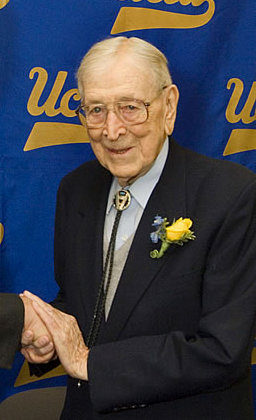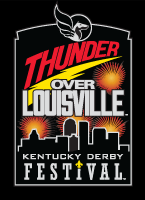Related Research Articles

Richard Andrew Pitino is an American basketball coach who is the men's head coach for St. John's Red Storm. He was also the head coach of Greece's senior national team. He has been the head coach of several teams in NCAA Division I and in the NBA, including Boston University (1978–1983), Providence College (1985–1987), the New York Knicks (1987–1989), the University of Kentucky (1989–1997), the Boston Celtics (1997–2001), the University of Louisville (2001–2017), Panathinaikos of the Greek Basket League and EuroLeague (2018–2020), and Iona University (2020–2023).

The John R. Wooden Award is an award given annually to the most outstanding men's and women's college basketball players. The program consists of the men's and women's Player of the Year awards, the Legends of Coaching award, and recognizing the All–America Teams.

Denzel Edwin Crum was an American men's college basketball coach at the University of Louisville from 1971 to 2001, compiling a 675–295 (.696) record. He guided the Cardinals to two NCAA championships and six Final Fours. Honored in the Naismith Memorial Basketball Hall of Fame since 1994, Crum was one of the major figures in the history of sports in Kentucky and in college basketball.

The Kentucky Derby Festival is an annual festival held in Louisville, Kentucky, during the two weeks preceding the first Saturday in May, the day of the Kentucky Derby. The festival, Kentucky's largest single annual event, first ran from 1935 to 1937, and restarted in 1956 and includes:

Thunder Over Louisville, the annual kickoff event of the Kentucky Derby Festival, is an airshow and fireworks display in Louisville, Kentucky. It is generally held each April, about two weeks before the first Saturday in May. In years where Easter Sunday falls on the usually scheduled weekend, Thunder is moved a week earlier. It is the largest annual fireworks display in North America and began as part of an opening ceremonies event in 1989 with daytime fireworks. 1990 brought the first nighttime fireworks event. It officially began in its current location along the Ohio River in 1991 with fireworks, and an annual air show was added in 1992.

The Grantland Rice Bowl was an annual college football bowl game from 1964 through 1977, in the NCAA's College Division, for smaller universities and colleges, and later Division II. The game was named for Grantland Rice, an early 20th century American sportswriter known for his elegant prose, and was originally played in his hometown of Murfreesboro, Tennessee.

The Kentucky–Louisville rivalry refers to the rivalry between the University of Kentucky Wildcats (Kentucky) and the University of Louisville Cardinals (Louisville). The Kentucky–Louisville rivalry is one of the most passionate rivalries, especially in men's college basketball. It is considered one of the most intense rivalries in the NCAA. The intensity of the rivalry is captivated by the proximity of the two schools and the state of Kentucky's interest in college sports.
The Louisville Cardinals men's basketball team is the men's college basketball program representing the University of Louisville in the Atlantic Coast Conference (ACC) of NCAA Division I. The Cardinals have officially won two NCAA championships in 1980 and 1986 ; and have officially been to 8 Final Fours in 39 official NCAA tournament appearances while compiling 61 tournament wins.

Frederick Robert "Rick" Robey is an American former college and professional basketball player. At 6'11", he played the center position for the Indiana Pacers, Boston Celtics, and the Phoenix Suns of the National Basketball Association (NBA).
The 1984 Mississippi Valley State Delta Devils team represented the Mississippi Valley State University as a member of the Southwestern Athletic Conference (SWAC) during the 1984 NCAA Division I-AA football season. Led by fifth-year head coach Archie Cooley, the Delta Devils played their home games at Magnolia Stadium—now known as Rice–Totten Stadium—in Itta Bena, Mississippi. Mississippi Valley finished the season with an overall record of 9–2 and a mark of 6–1 in conference play, placing second in the SWAC. The team qualified for the NCAA Division I-AA playoffs, losing to Louisiana Tech in the first round. With an offense led by quarterback Willie Totten and wide receiver Jerry Rice, the Delta Devils scored 628 points on the season, averaging more than 57 points per game.
Richard Wilson is a retired American basketball player. He played for the Atlanta Hawks of the National Basketball Association (NBA) from 1978 to 1980.

The Indiana–Kentucky rivalry is a college sports rivalry between the Indiana University Bloomington Hoosiers and the University of Kentucky Wildcats. The rivalry between these two schools, located about 180 miles (290 km) apart, dates to their first college football game in 1893, and has continued across all sports, with the men's basketball series gaining particular attention. The football game was previously played for a wooden Bourbon Barrel trophy, which was discontinued in 1999.
The following is a timeline of the history of the city of Louisville, Kentucky, USA.
The 1973 Western Kentucky football team represented Western Kentucky University during the inaugural 1973 NCAA Division II football season. The team came off an 7–3 record from the prior season and was led by coach Jimmy Feix. They finished the regular season undefeated and won the Ohio Valley Conference championship. The Hilltoppers made the initial NCAA Division II Football Championship, winning their first two playoff games, including a win over Grambling in the Grantland Rice Bowl, before falling in the championship game to Louisiana Tech in the Camellia Bowl. Their rankings in the final polls were UPI 2 and AP 3.
The 1893 Kentucky State College Blue and White football team represented Kentucky State College—now known as the University of Kentucky—as an independent during the 1893 college football season. Led by John A. Thompson in his first and only season as head coach, the Blue and White compiled a record of 5–2–1.
The Kentucky Athletic Hall of Fame is a sports hall of fame for the U.S. state of Kentucky established in 1963. Individuals are inducted annually at a banquet in Louisville and receive a bronze plaque inside Louisville's Freedom Hall. The Kentucky Athletic Hall of Fame other wise known as the Kentucky Sports Hall of fame, is a non-profit organization funded by the Kentucky Lottery and owned and operated by the Louisville Sports Commission.

Brian Bowen II is an American professional basketball player for the Iowa Wolves of the NBA G League. He originally committed to play college basketball for the Louisville Cardinals but was suspended by the team after a national college basketball corruption scandal which alleged that his family accepted payments in exchange for his choice to attend Louisville. He later tried to play for the South Carolina Gamecocks, but due to an NCAA ruling, he removed himself from college and the 2018 NBA draft altogether. Nicknamed "Tugs", he was named a McDonald's All-American as a senior in high school in 2017.

David Ricardo Johnson is an American professional basketball player for the Raptors 905 of the NBA G League. He played college basketball for the Louisville Cardinals, and was drafted by the Toronto Raptors in the second round of the 2021 NBA Draft.
Taylor Malham is an American professional soccer player who plays as a midfielder for Chicago Red Stars of the National Women's Soccer League (NWSL). A native of Broken Arrow, Oklahoma, she played college soccer at Arkansas.
References
- 1 2 Lerner, Danielle (February 1, 2018). "No hoops for you: Kentucky Derby Festival cancels high school basketball all-star game". The Courier-Journal. Retrieved April 21, 2023.
- ↑ Patterson, Lezlie (April 22, 1986). "Taylor plays all-star ball in Derby Classic". The Columbia Record. p. 7-B. Retrieved April 24, 2023– via Newspapers.com.
- ↑ Greene, H. H. Jr. (April 10, 1977). "The Derby Festival Classic". The Courier-Journal. Kentucky Derby Festival Section, p. 5. Retrieved April 25, 2023– via Newspapers.com.
- ↑ "Basketball Classic features future stars". The Courier-Journal. April 19, 1992. Derby Festival Advertising Section, p. 15. Retrieved April 25, 2023– via Newspapers.com.
- ↑ Fields, Mike (January 26, 1996). "Mason County finds glass slipper a good fit". Lexington Herald-Leader. p. C4. Retrieved April 25, 2023– via Newspapers.com.
- ↑ Demling, Jody (December 29, 2010). "Derb Classic Moves to KFC Yum! Center". The Courier Journal. p. C3. Retrieved May 1, 2023– via Newspapers.com.
- 1 2 3 4 5 Estes, Gentry (April 17, 2018). "KDF Basketball Classic could bounce backin '19". The Courier-Journal. pp. A1, A9 . Retrieved April 21, 2023– via Newspapers.com.
- ↑ Adams, Kirby (April 6, 2015). "Kentucky Derby Festival Basketball Classic". The Courier-Journal. Retrieved May 2, 2023.
- 1 2 3 Green, Ed (April 20, 2013). "Kentucky Derby Festival Basketball Classic celebrates 40 years" . Louisville Business First. Archived from the original on April 26, 2013. Retrieved April 28, 2023.
- 1 2 "Kentucky Derby Festival set in April". The News-Democrat. March 22, 1973. p. B-5. Archived from the original on April 29, 2023. Retrieved April 29, 2023– via Newspapers.com.
- ↑ Wiley, Ralph (August 2, 1982). "Their Rite of Passage". Sports Illustrated. Archived from the original on April 29, 2023. Retrieved April 29, 2023.
- 1 2 Brubaker, Bill (April 9, 1995). "All-Stars, All Business". The Washington Post. Archived from the original on March 8, 2018. Retrieved April 21, 2023.
- 1 2 Forde, Pat (April 21, 1996). "Owens nips odds to lure top players to Classic". The Courier-Journal. p. C1. Retrieved April 25, 2023– via Newspapers.com.
- ↑ "McDonald's Kentucky Derby Festival Classic presents stars". The Courier-Journal. March 27, 1988. Kentucky Derby Festival Preview Section, p. 4. Archived from the original on May 2, 2023. Retrieved May 1, 2023– via Newspapers.com.
- 1 2 3 4 5 6 White, Bob (January 25, 1983). "Derby Classic, once top all-star game, victim of NCAA rules". The Courier-Journal. p. B10. Retrieved April 29, 2023– via Newspapers.com.
- 1 2 Kelly, Tim (March 24, 1982). "The Capital Classic: Winning and Losing in the All-Star Game Sweepstakes". The Washington Post. Retrieved April 29, 2023.
- ↑ White, Bob (April 18, 1981). "Derby Classic gets four more players". The Courier-Journal. p. C2. Retrieved April 30, 2023– via Newspapers.com.
- 1 2 "Three Derby Classic players headed for Louisville". United Press International. April 24, 1981. Retrieved April 30, 2023.
- ↑ Reed, Billy (March 22, 1984). "Lexington's next step might be to snatch the Twin Towers". The Courier-Journal. p. C1. Retrieved April 29, 2023– via Newspapers.com.
- ↑ "Division I Proposal - RWG-14-1". NCAA. Retrieved May 10, 2023.
- ↑ "Derby Classic back under new format, but with local flavor". The Courier-Journal. November 4, 1983. p. D3. Retrieved May 2, 2023– via Newspapers.com.
- ↑ "Derby Classic tickets available". News-Democrat and Leader. April 15, 2005. p. B-2. Retrieved April 24, 2023– via Newspapers.com.
- ↑ Temkin, Barry (April 17, 1988). "THE HIGH SCHOOL ALL-STAR TUG-OF-WAR". The Chicago Tribune. Archived from the original on April 1, 2023. Retrieved April 25, 2023.
- ↑ Brewer, Jerry (April 16, 2006). "Adidas a good fit for Derby Classic". The Courier-Journal. p. C12. Retrieved April 25, 2023– via Newspapers.com.
- ↑ Roberts, Ben (February 1, 2018). "Kentucky basketball event that has featured NBA stars as recruits canceled for 2018" . Lexington Herald-Leader. Archived from the original on May 28, 2018. Retrieved April 24, 2023.